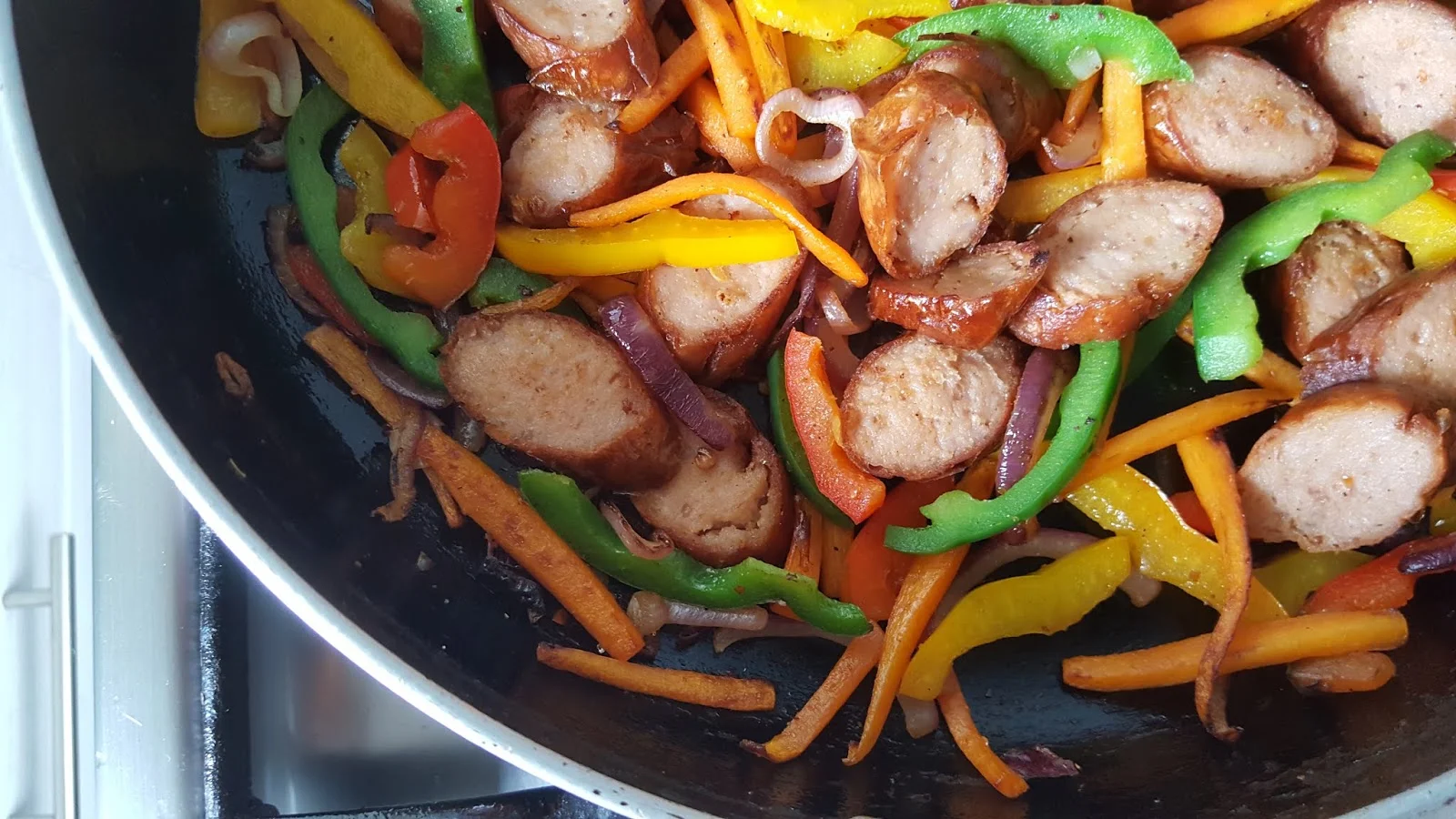INGREDIENTS
2 Sausages Cooked
1 Large Carrot
1 Red Bell Pepper
1 Yellow Bell Pepper
1 Green Bell Pepper
1 Onion
Pinch Salt
METHOD

Prep time: 10 Minutes
Cook time: 20 Minutes
Total time: 30 Minutes
Yield: 2 Servings
Ingredients
- 2 Sausages, cooked
- 1 Large Carrot
- 1 Green Bellpepper
- 1 Yellow Bellpepper
- 1 Red Bellpepper
- 1 Onion
- Salt to taste
- 1/2 Teaspoon Black Pepper
- 2 Tablespoons Vegetable Oil
- Add carrots in pan with vegetable oil. Stir fry 3 minutes until cooked but still crunchy
- Add onions fry until golden brown. Add cooked chopped sausages and cook 2 minutes
- Sprinkle salt and stir fry another few seconds
- Add the chopped bell peppers, toss 2 minutes, sprinkle black pepper
- Remove from heat and serve
Breakfast sausage – Frequently Asked Questions (FAQs)
1. What is breakfast sausage?
Breakfast sausage is a seasoned ground meat product—typically made from pork, though turkey and plant-based versions are also popular. It's flavored with herbs like sage, black pepper, thyme, and sometimes maple syrup or red pepper flakes, and is commonly served at breakfast.
2. Is it different from regular sausage?
Yes. Unlike cured or smoked sausages, breakfast sausage is usually fresh (uncured), formed into patties or links, and has a distinctive herby-sweet-spicy profile ideal for breakfast pairings.
3. Is breakfast sausage cooked or raw?
Most are sold raw and require cooking. Pre-cooked varieties are also available—always check the label to confirm.
4. Can I eat breakfast sausage on a diet?
It depends. Traditional pork sausage can be high in fat and sodium. Healthier options include:
- Turkey or chicken sausage (lower fat)
- Reduced-sodium versions
- Plant-based sausages
5. Can it be frozen?
Yes. Raw or cooked sausage can be frozen for up to 2–3 months. Always store it in an airtight container or freezer bag.
6. Is it safe during pregnancy?
Yes—if fully cooked to 160°F (71°C). Undercooked sausage poses a risk of foodborne illness.
Nutrition Card – per 1 link (approx. 45g)
| Nutrient | Traditional Pork | Turkey Sausage | Plant-Based | Notes |
|---|---|---|---|---|
| Calories | 140–180 kcal | 90–120 kcal | 70–100 kcal | Varies by brand |
| Protein | 5–7 g | 8–10 g | 6–8 g | Sausage is a good protein source |
| Total Fat | 12–15 g | 6–8 g | 4–6 g | Pork versions are highest in fat |
| Saturated Fat | 4–5 g | 2–3 g | 0.5–2 g | Choose lower saturated fat options |
| Carbohydrates | 0–3 g | 1–2 g | 2–5 g | Plant-based versions may contain more carbs |
| Sodium | 300–500 mg | 250–400 mg | 250–450 mg | High in all types—check labels |
| Cholesterol | 30–45 mg | 25–35 mg | 0 mg | Plant-based = cholesterol-free |
| Iron | 2–6% DV | 4–8% DV | 6–10% DV | Fortified in plant-based types |
📌 Nutrition Notes:
- Sausage is energy-dense, so portion control matters.
- Look for leaner meats and reduced-sodium labels for a heart-healthier option.
- Many plant-based versions are fortified with B12 and iron, helpful for vegetarians.
Dietary Compatibility & Allergy Notes
| Diet Type | Is It Suitable? | Notes |
|---|---|---|
| Vegan | ❌ No (except plant-based) | Choose certified vegan versions |
| Vegetarian | ❌ No (except plant-based) | Plant-based sausage is fine |
| Gluten-Free | ⚠️ Check label | Some sausages contain fillers with gluten |
| Keto/Low-Carb | ✅ Yes (most types) | Avoid sweet/maple-flavored versions |
| Paleo | ⚠️ Depends on brand | Choose brands with clean ingredients |
| Halal/Kosher | ⚠️ Only with certification | Look for halal or kosher-certified packaging |
| Nut-Free | ✅ Generally yes | Always check plant-based sausage ingredients |
| Lactose-Free | ✅ Yes (unless cheese-flavored) | Check for dairy in flavored or processed versions |
📌 Dietary Notes:
- Read labels for additives, gluten, and sugar.
- Air-frying, grilling, or baking are healthier cooking methods than frying.
- For a lighter breakfast, pair sausage with eggs and vegetables instead of refined carbs.





No comments
Post a Comment